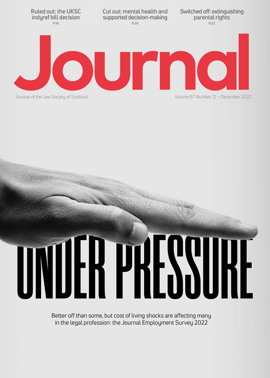Agriculture: A future support framework

My last article (Journal, September 2022) reported on the Scottish Government consultation Land Reform in a Net Zero Nation, which covers a broad range of issues including proposals for reform of the agricultural tenanted sector.
On 29 August, the Scottish Government published Delivering our vision for Scottish Agriculture. Proposals for a New Agriculture Bill, which is concerned with the whole agricultural sector. Its six parts cover the headings that follow.
Future payment framework
The bill would provide an agriculture support regime to be implemented flexibly from 2025. There should be security of income for farmers, and mechanisms in place to enable activities to be rewarded, for feeding the nation and ensuring a sustainable and regenerative stewardship of the land.
The consultation proposes a tiered system of payments. Tier 1 is a base level direct payment to support farmers engaged in food production and land management; tier 2 would bring an enhanced level of direct payment to deliver outcomes relating to efficiency, reducing greenhouse gas emissions and nature restoration; tier 3, an elective payment, would focus on targeted measures for nature restoration, innovation support, and supply chain support; and tier 4 would be complementary support.
Delivery of key outcomes
The Government wishes to ensure Scotland will have a support framework that delivers high quality food production, climate mitigation and adaptation, nature protection and restoration, and the wider management of Scotland’s natural assets. Targeted mechanisms are proposed to deliver these key outcomes.
Respondents are asked whether they agree with payments to support climate change mitigation objectives, and with a mechanism to enable payments that are conditional on outcomes that deliver climate change mitigation and/or adaptation measures. Should the bill include mechanisms to protect and restore biodiversity, support clean and healthy air, water and soils, and contribute to reducing flood risks? Should it enable payments that are conditional on outcomes that support nature maintenance and restoration?
Similar questions cover support for high quality food production, and grants to support industry in the agri-food supply chain, to encourage sustainability, efficiency, co-operation, development, education, processing and marketing. Also, should the bill enable support for improvements in animal health, welfare and biosecurity beyond legal minimum standards?
Skills and innovation
It is proposed that the bill continues to provide a full panoply of support for knowledge transfer, innovations and skills within the agricultural sector.
Payment framework data
Ministers propose to take power to create an integrated administration and control database to collect specified information relating to applications, and commitments by beneficiaries of support, and to share this information subject to complying with GDPR.
Modernising tenancies
The Net Zero consultation proposed a new land use tenancy, which would allow diverse land management activities to deliver climate and environmental objectives.
The present consultation considers whether the rights to diversify of 1991 Act and long/modern limited duration tenants require review. It states that a tenant requires the landlord’s agreement before undertaking diversification (although the landlord’s failure to agree and relatively limited right to object can be overruled by the Scottish Land Court). It asks whether the Government should have a mechanism to amend the list of permissible diversifications. There is no list at present: it is currently the Land Court’s remit to determine whether a refusal is reasonable. The consultation asks whether ministers should have power to determine what are acceptable diversifications. If so, should the Tenant Farming Commissioner be able to issue guidance to assist tenants and landlords?
Waygo and compensation at waygoing are considered. It is proposed to amend sched 5 to the 1991 Act to enable tenant farmers to support biodiversity and undertake climate change mitigation and adaptation activity on their tenanted farms, which activities would be included as factors in calculating waygo. One might query how this would be valued based on value to an incoming tenant.
Is a definitive timescale needed for waygo payments by the landlord on termination of a tenancy? The consultation suggests that tenants can experience delays in receiving payments.
Rent reviews are under discussion (again), ministers having now conceded that the proposed revisals to s 13 of the 1991 Act and s 9 of the 2003 Agricultural Holdings (Scotland) Act in the Land Reform (Scotland) Act 2016 do not work. Alternative methods to calculate rent are needed: the 1991 Act focused on open market rent, which is no longer achievable given the lack of an open market for secure tenancies, and the 2016 Act tied the rent to the economic potential of the holding, which has the potential to distort the rent calculation.
Respondents are asked whether a new approach is necessary, taking account of three elements:
- comparable rents for secure or fixed duration tenancies;
- assessment of earning potential by means of a farm budget;
- consideration of economic outlook for the next three years with a balancing of the three core elements.
Finally, respondents are asked to consider whether in all cases of resumption, the tenant should receive, in addition to payment for disturbance, a share in the uplift of development value.
Fair wages
Ministers propose to ensure that fair work conditions, including the real living wage, are applied to all Scottish agricultural workers.
Responses to the consultation were due by 5 December 2022.
Perspectives
Features
Briefings
- Criminal court: Farewell retrospective
- Agriculture: A future support framework
- Corporate: Is there a creditor duty?
- Intellectual property: "Reclaiming the UK statute book"
- Sport: Flouting their own rules?
- Succession: Crofting tenancy transfers in intestacy
- Scottish Solicitors' Discipline Tribunal: December 2022
- Property: Conveyancing – the future is in our hands
- In-house: With a fair wind







